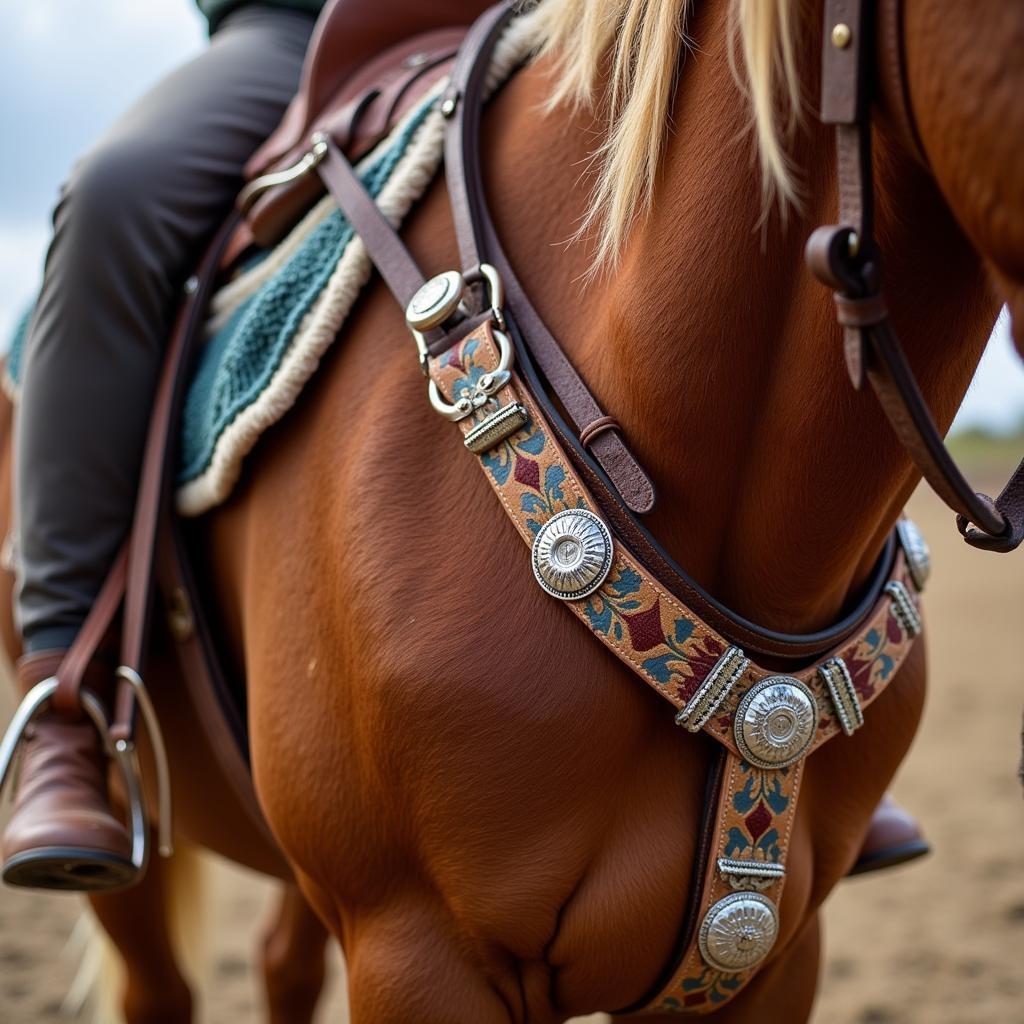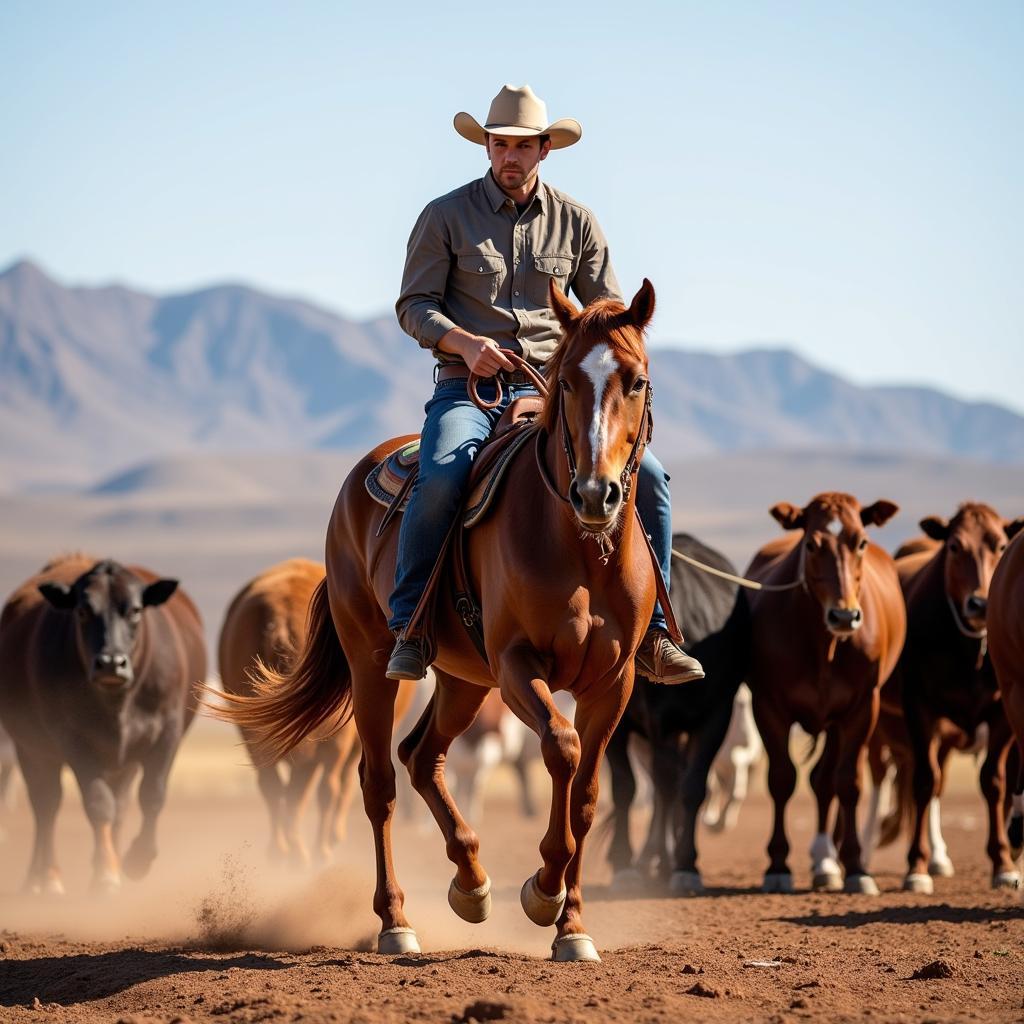The Latigo Horse, a term deeply rooted in the history of horseback riding, evokes images of the American West and working cowboys. While not a specific breed, the term “latigo horse” encompasses a wide range of equine partners chosen for their strength, stamina, and reliability in various tasks.
 Latigo Horse in Western Riding
Latigo Horse in Western Riding
The History and Significance of the Latigo Strap
The term “latigo” itself originates from the Spanish word for “strap.” This essential piece of tack secures the cinch on a Western saddle, keeping it firmly in place during riding. The quality and craftsmanship of the latigo strap were paramount to riders, reflecting both their practicality and personal style. Over time, the term “latigo horse” emerged, signifying a horse dependable and well-suited for working purposes, mirroring the reliability of a well-made latigo strap.
Characteristics of a Latigo Horse
While breed isn’t the defining factor, certain traits are commonly associated with latigo horses:
- Strength and Stamina: These horses are known for their ability to work long hours, often under challenging conditions.
- Calm Temperament: A calm and willing disposition is crucial, as latigo horses often encounter various situations and need to remain manageable.
- Surefootedness: Navigating diverse terrain, from rocky hillsides to open plains, requires agility and balance.
- Intelligence and Trainability: Latigo horses are often trained for specific tasks and need to be quick learners and responsive to cues.
 American Quarter Horse Working on a Ranch
American Quarter Horse Working on a Ranch
Breeds Often Considered Latigo Horses
Though not limited to these breeds, some are frequently chosen for their suitability as latigo horses:
- American Quarter Horse: Known for their athleticism, “cow sense,” and trainability, Quarter Horses are a classic choice.
- Morgan Horse: Their versatility, stamina, and willing nature make Morgans well-suited for ranch work and riding.
- Appaloosa: Recognized for their distinctive spotted coat patterns, Appaloosas are hardy, intelligent, and sure-footed.
- Mustang: These wild horses, descended from Spanish stock, possess incredible resilience and stamina, making them suitable for challenging environments.
The Latigo Horse Today
The tradition of the latigo horse extends beyond historical contexts. Today, these versatile equines continue to be valued partners in:
- Ranch Work: From herding cattle to checking fences, latigo horses remain essential assets on working ranches.
- Trail Riding: Their stamina and sure-footedness make them ideal companions for exploring rugged trails.
- Western Riding Disciplines: Latigo horses often excel in events like reining, cutting, and team penning.
Finding the Right Latigo Horse
Choosing a latigo horse is a personal decision based on individual needs and intended use. Factors to consider include:
- Experience Level: For novice riders, a well-trained and experienced horse is recommended.
- Discipline: Different disciplines may require specific skills and temperaments.
- Conformation and Soundness: A horse’s physical build and overall health are crucial for its longevity and performance.
Conclusion
The term “latigo horse” encompasses more than just a breed; it represents a timeless partnership between horse and rider. These horses, chosen for their strength, reliability, and unwavering spirit, continue to play vital roles in various equestrian pursuits, reminding us of the enduring legacy of the working West.
FAQs
1. Is a latigo horse a specific breed?
No, a latigo horse isn’t a distinct breed. It refers to any horse, regardless of breed, suitable for working purposes and typically used with a Western saddle secured by a latigo strap.
2. What makes a good latigo horse?
A good latigo horse possesses a combination of strength, stamina, a calm temperament, intelligence, and trainability.
3. Are latigo horses only used for ranch work?
While often associated with ranch work, latigo horses are also used for trail riding, Western riding disciplines, and other equestrian activities.
4. Where can I find a latigo horse for sale?
Reputable breeders, trainers, and equine rescue organizations can be excellent resources for finding a latigo horse.
5. How much does a latigo horse typically cost?
The price of a latigo horse varies widely depending on factors such as breed, age, training, and location.
Need help finding the perfect latigo horse? Contact us at Phone Number: 0772127271, Email: [email protected] or visit us at QGM2+WX2, Vị Trung, Vị Thuỷ, Hậu Giang, Việt Nam. Our dedicated team is available 24/7 to assist you.
Interested in learning more about Western riding and horse care? Explore our other informative articles on Justus Horses USA.